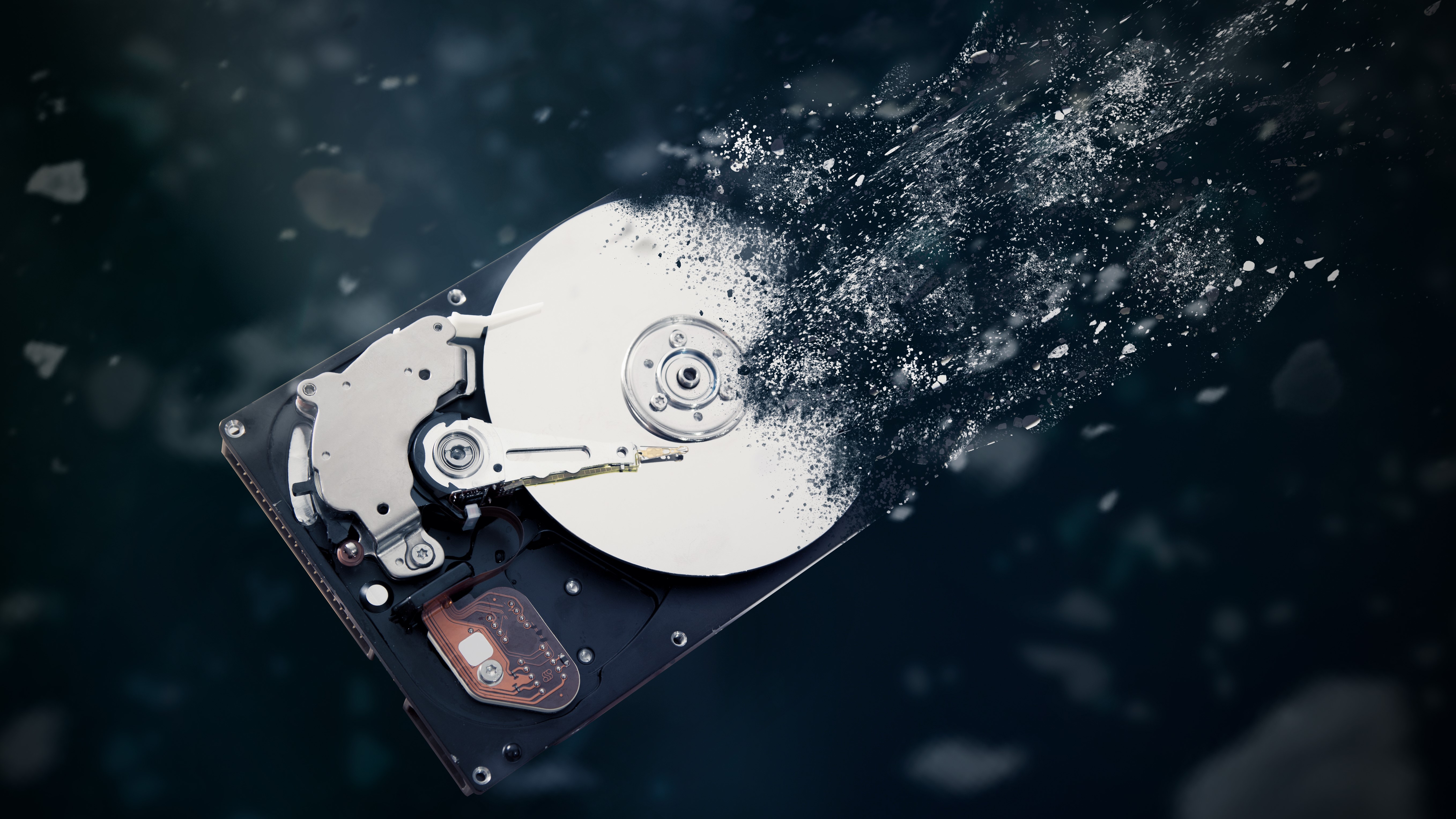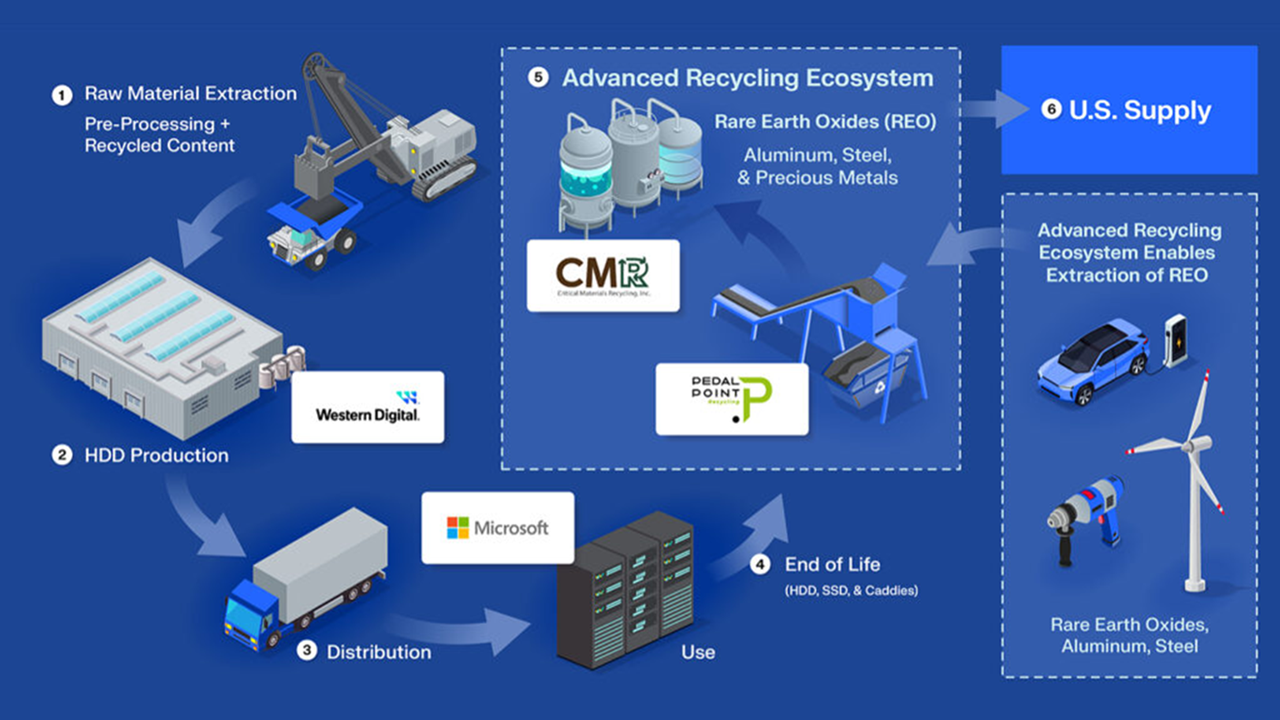WD launches HDD recycling process that reclaims rare earth elements, cuts out China
Reclaiming minerals could help reduce dependence on China, reduce greenhouse gases by 95%.

While most people enjoy PCs that are powered by SSDs, mechanical hard drives are still king in the datacenter. When these drives reach the end of their useful lives, they are usually shredded, and the key materials they’re made of – including several rare earth elements (REE) – end up as e-waste.
At the same time, countries are mining these same materials and emitting a lot of greenhouse gases in the process. And China, a major source of REE, recently announced export restrictions on seven of them, potentially limiting the U.S. tech industry’s access to materials such as dysprosium, which is necessary for magnetic storage, motors, and generators.
Yesterday, Western Digital announced that it has created a large-scale hard disk drive recycling program in concert with Microsoft and recycling-industry partners CMR (Critical Materials Recycling) and PedalPoint Recycling. The new process reclaims Rare Earth Oxides (REO) containing dysprosium, neodymium, and praseodymium from hard drives, along with aluminum, steel, gold, palladium, and copper. The REO reclamation takes place completely within the U.S. and those materials go back into the U.S. market.
Dubbed the Advanced Recycling and Rare Earth Material Capture Program, WD’s initiative has already saved 47,000 pounds worth of hard drives, SSDs, and caddies from landfills or less-effective recycling programs. WD was able to achieve a more than 90% reclaim rate for REE and an 80% rate for all of the shredded material.
The drives came from Microsoft’s U.S. data centers where they were first shredded and then sent to PedalPoint for sorting and processing. Magnets and steel were then sent to CMR, which uses its acid-free dissolution recycling (ADR) technology to extract the rare earth elements.

CMR’s ADR process uses a copper salt solution to create a selective leaching that produces 99.5 percent pure REO. The company avoids harsh chemicals that would damage the REO or adjacent materials such as aluminum.
The reclaimed rare earth elements can then be sold back into the U.S. supply system where they can be used to manufacture new tech products. According to WD’s whitepaper, the reclaiming process produces 95 percent fewer greenhouse gases than virgin mining of the same materials.
Get Tom's Hardware's best news and in-depth reviews, straight to your inbox.
If done at a large scale, the reclaimed materials could take the place of some of the materials the U.S. sources from China. However, of the seven materials China is restricting – samarium, gadolinium, terbium, dysprosium, lutetium, scandium, and yttrium – only dysprosium is commonly found in hard drives.
“HDDs are vital to our data center infrastructure, and advancing a circular supply chain is a core focus for Microsoft,” Chuck Graham, Microsoft CVP, Cloud Sourcing, Supply Chain, Sustainability, and Security said in a press release.
To get their recycling program up and running, WD and its partners went through 18 months of testing, with the initial study period beginning in 2023 and ending in December 2024 Now the company is working with more partners.
"Western Digital is currently expanding the HDD rare earth material capture program based on the successful pilot with Microsoft," Jackie Jung, WD's VP of Global Operations Strategy and Corporate Sustainability told Tom's Hardware. "This program is now in development with a number of our hyperscale customers."
The potential need for hard drive recycling is huge and growing. According to the Financial Times, there were 23,000 data centers with 70 million servers as of 2022. Each of these servers has multiple hard drives which reach their end of life, often after just three to five years. The amount of e-waste overall is expected to reach 75 million tons by 2030.
Follow Tom's Hardware on Google News to get our up-to-date news, analysis, and reviews in your feeds. Make sure to click the Follow button.
Avram Piltch is Managing Editor: Special Projects. When he's not playing with the latest gadgets at work or putting on VR helmets at trade shows, you'll find him rooting his phone, taking apart his PC, or coding plugins. With his technical knowledge and passion for testing, Avram developed many real-world benchmarks, including our laptop battery test.
-
Zaranthos What did China expect was going to happen when they tried to play tough and cut off rare earth exports to the the USA? For one thing the USA has rare earth and also has an administration that won't tie the hands of industry with regulations that prohibit utilizing those resources. They just proved the point that the USA can't be totally reliant on China, or any single country for that matter, for critical resources. They also sent a signal to the rest of the world that if they displease China they could be cut off as well signalling that nobody should be overly reliant on China. Those resources won't be so "rare" when more people start actually collecting them instead of letting any single country control the market. Even better is they lit a fire under someone to actually recycle existing resources.Reply -
Kindaian The problem is that for permanent / strong magnets, it is used heavy rare earths, which are normally mixed with radioactive materials.Reply
Any processing of those from raw requires a permanent place for the radioactive leftovers.
USA currently has no facilities to process heavy rare earths (even if they may have permanent radioactive storage facilities).
Europe is worse on that as they lack permanent storage facilities and most of the others that exist are for the nuclear centrals leftovers - be it fuel rods or contaminated construction materials after they are decommissioned.
Reliance on China for this has now resulted in this kind of dependency. Changing that will take more than a couple of years for sure as new factories will need to be built from scratch. -
bit_user Reply
This is not a response to the current trade war. As the article notes:Zaranthos said:What did China expect was going to happen when they tried to play tough and cut off rare earth exports to the the USA? For one thing the USA has rare earth and also has an administration that won't tie the hands of industry with regulations that prohibit utilizing those resources.
"To get their recycling program up and running, WD and its partners went through 18 months of testing, with the initial study period beginning in 2023 and ending in December 2024"
However, China has been toying with access to rare earth minerals for a while. Thanks to their restrictions, the economic viability of projects like this has certainly gotten a boost.
I look forward to contributing my personal stacks of old HDDs, when they open this up to the public (or to e-waste recyclers that serve the public). -
Hooda Thunkett I'm skeptical. It seems like every time something like this is announced, nothing happens. I suspect we will just end up importing cheap rare earths from poor nations that don't care about the pollution, even when tariffs are considered. This plant will simply be deemed a "green dream" or some such, and if ever completed, will not be able to produce at a competitive price.Reply
I'd like to be wrong. -
bit_user Reply
They said they already processed about 24 tons, which seems like enough to have a pretty good idea whether it'll be profitable. I think the best part is that this started way before China's current export restrictions. If it seemed to make sense back then, it's only going to look better now.Hooda Thunkett said:I'm skeptical. It seems like every time something like this is announced, nothing happens.
Even if China lifts its restrictions on rare earth exports, the US is likely to protect its local supply by retaining some tariffs on them. So, I think it's probably one of the safer bets out there, these days. -
Notton I'd love for this program to extend to end users.Reply
Like maybe a trade-in program.
Give us $5~10 per HDD.
I don't care if it's a rebate that only works at WD or BB, etc because I'll grab another HDD with the money I get from the trade-in. -
Zaranthos Replybit_user said:This is not a response to the current trade war. As the article notes:
"To get their recycling program up and running, WD and its partners went through 18 months of testing, with the initial study period beginning in 2023 and ending in December 2024"
However, China has been toying with access to rare earth minerals for a while. Thanks to their restrictions, the economic viability of projects like this has certainly gotten a boost.
I look forward to contributing my personal stacks of old HDDs, when they open this up to the public (or to e-waste recyclers that serve the public).
Wasn't hard to see this coming for anyone actually watching. The USA's over reliance on China started in the 1990's and by the 2000's US manufacturing was already suffering devastating losses. Cheap labor, almost no regulatory burden, and absurd trade policies outsourced manufacturing all over the world. Automation and robotics will level the labor cost playing field probably in the near future.
<<Link removed by moderator>> -
2Be_or_Not2Be Hey, they could buy up all the supply of magnets on Amazon before the tariffs price them too high. ;)Reply -
bit_user Reply
From what I've heard, more factory jobs in the US have already been lost to automation than outsourcing.Zaranthos said:Automation and robotics will level the labor cost playing field probably in the near future.
SSSHhhhhhh!!2Be_or_Not2Be said:Hey, they could buy up all the supply of magnets on Amazon before the tariffs price them too high. ;)
: D -
danwat1234 "hard drives which reach their end of life, often after just three to five years." , HUH? Enterprise drives can have great reliability through 70000 hours plus of run time.. i have a few with 110K hours, which are 250GB WD RE2 i believe.Reply
Iifetims is mostly about number of power cycles and temperature cycles and vibration it is subjected to.
